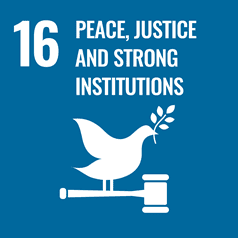Trust is a luxury many of us take for granted.
The security of knowing ‘someone is good and honest and will not harm you, or that something is safe and reliable’, is heavily influenced by your upbringing, life experiences and ability to connect with others.
But what happens when your background is so vastly different from those around you that you're unable to decipher their intentions? Is that smile – or offer of help – from a stranger genuine, or is there another motive?
In certain places, a stranger showing kindness could be a ruse to frame you for a crime or snatch you from your family.
For Afghan refugee Laila*, and others like her, it’s no wonder anxiety and distrust become the default.
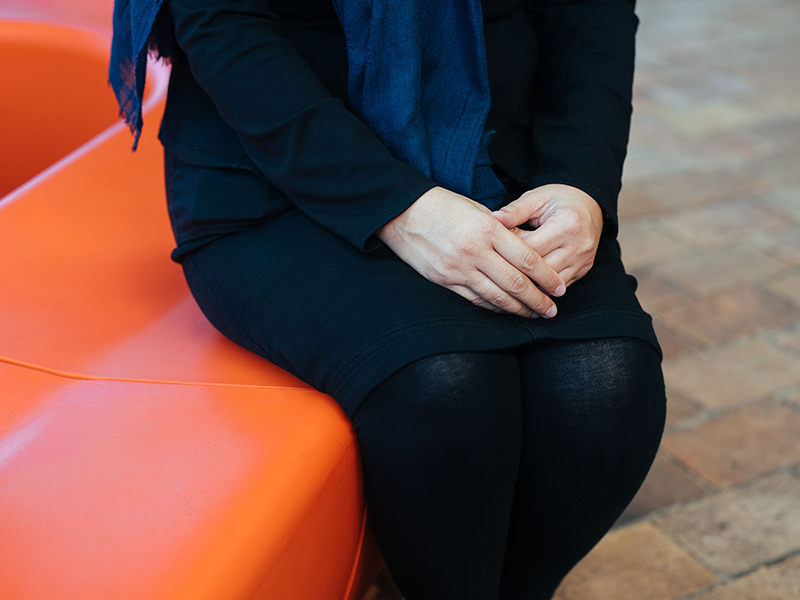
Laila and her family settled in Newcastle as Afghan refugees six years ago
Arriving from Iran six years ago at the age of 32, Laila settled in Newcastle with no English skills, recognised qualifications or community beyond her parents and siblings.
She recalls the first six months being incredibly daunting.
“I was so scared of people and worried about racism,” she explains.
“When we arrived here as refugees, everyone had a beautiful smile and was really friendly, but we were fearful. Were they being fake? We had learned not to trust people in our home country.”
Current global newsfeeds offer justification for Laila’s relationship with trust.
As the latest accounts of sickening violence in her homeland reach her, Laila watches on helplessly, distraught for her family, including her husband, back in Afghanistan.
Her family is Hazara – a Persian-speaking ethnic group from central Afghanistan.
Despite being born in Iran, she and her siblings were never recognised as citizens, meaning an education, a job, and the ability to own their own home were either extremely limited or totally non-existent. Racism was rife.
Her uncle met with the fatal end of this persecution, losing his life at the hands of extremists. She worries for another uncle currently in hiding there – he hasn’t been heard from for three weeks.
“When we arrived here as refugees, everyone had a beautiful smile and was really friendly, but we were fearful. Were they being fake? We had learned not to trust people in our home country.”
The world is in a massive state of change. Over the past 70 years, more than 82 million people have been forcibly relocated from their homes due to war and conflict.
Australia has taken in about 10,000 displaced people per year for the past decade, with Newcastle and Lake Macquarie having a more than 20-year history of welcoming refugee and asylum-seeker families from places like Sudan, Congo, Iraq, Syria and Afghanistan.
Given the humanitarian crises unfolding overseas, it’s more important than ever for our nation to be equipped to create spaces of belonging for new arrivals.
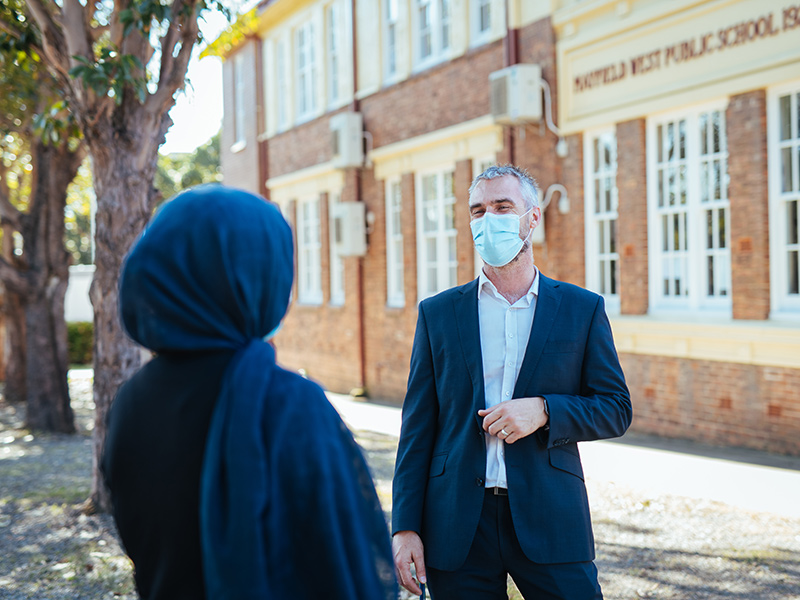
Laila and Principal Matthew Bradley talk outside Mayfield West Demonstration School
Passing school gates around Newcastle, snippets of English can be heard playfully intertwined with other exotic languages, including Swahili, Farsi and Dari.
This is the cultural collision point. School. Youth the catalyst for a fusion of nations.
At Mayfield West Demonstration School, Principal Matthew Bradley flits from one classroom to the next, busily engaging with everyone he encounters.
Outside of Sydney, the NSW Hunter region is home to the highest proportion of students from non-English speaking families.
“People’s stories are what’s important,” Principal Bradley comments.
“I’ve had children sitting in classrooms together who would have been at war where they came from. We’re different people and we come from different places, but we’re all here together now, and that’s what matters.”
“It can be a huge challenge. They’re Syrian or Afghan or Iraqi kids but they’re also trying to be Aussie kids.”
His work crafting a welcoming environment for refugee families at Mayfield and former post at Islington Public School have earned Principal Bradley a glowing reputation in the sector.
“We know that when they arrive, the parents of many migrant families seek out people of the same culture for support. It’s natural. Which means that for many of the children, the classroom is where two worlds collide – their former life and their new one.
“It can be a huge challenge. They’re Syrian or Afghan or Iraqi kids but they’re also trying to be Aussie kids.”
For Laila and her younger sister, Mariam*, Principal Bradley’s welcoming presence is a fond memory of their early days in Newcastle.
“I would come and pick Mariam up from school. One day Matt asked me what languages I spoke because there were little kids there with no English. I had done my English language course at TAFE so he invited me to volunteer in the classroom to support the Afghan students with their work, but it ended up working both ways,” Laila explains.
“I was so nervous on my first day. My English was weak, and I felt embarrassed to ask people to repeat things.
“But the difference between where we’re from and Australia is that there, no one cared what you needed, but here you ask Aussie kids for what you need, and they help you.”
Five years on and Laila continues to work in the primary school system – now employed as a Learning Support Officer.
“I’ve always liked teaching. I was my brother and sister’s first teacher. I think it makes a difference to meet a new student in their own language. It makes them comfortable. It builds trust,” she says.
Principal Bradley nods in agreement.
“Some things are so simple, but it can feel very daunting for schools who are new at this.”
“You can’t make someone belong. You can invite them but it’s ultimately a choice they make,” he says.
“It’s little things. For example, we used to have the year groups eat lunch at different times of day. I noticed that, often, the older sibling in our refugee families would bring the food from home to share with the younger ones.
“We changed lunch hours to ensure everyone had the opportunity to eat together. A small way to ensure all our students felt safe, accepted and understood.
“It’s supplying them with the same uniform if they can’t afford it. We know the kids want to show up and be valued but also don’t want to stand out.
“It’s giving them shared experiences like field trips or drawing activities to learn from so they don’t come into a curriculum they have no knowledge of.
“Some things are so simple, but it can feel very daunting for schools who are new at this. The education system can be incredibly wedded to conservatism but as our communities change, we need to apply a new lens.”
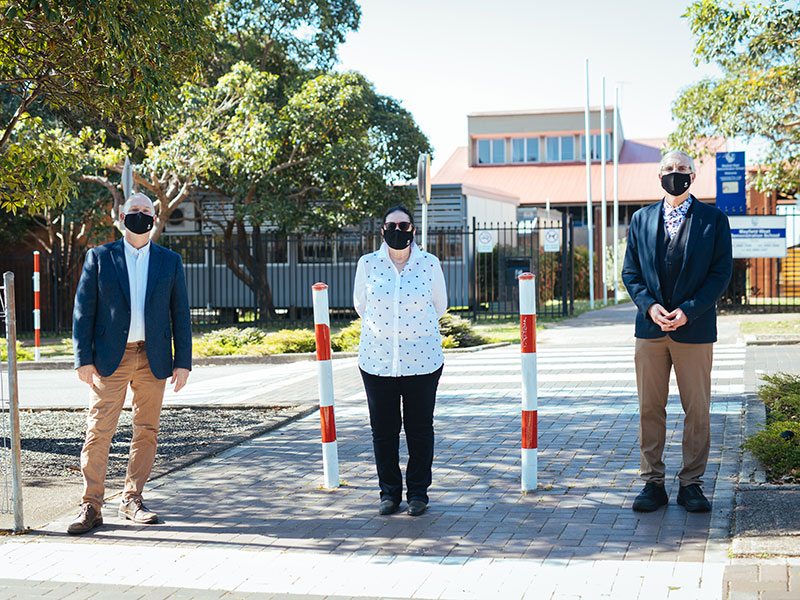
Pictured left to right: Associate Professor Scott Imig, Dr Maura Sellars and Professor John Fischetti have unearthed exceptional school leadership practices and strategies
It was exactly this type of thinking that attracted the attention of global education experts Associate Professor Scott Imig, Dr Maura Sellars and Professor John Fischetti from the University of Newcastle.
“We heard from some local principals that they often struggle to meet the needs of refugee families. They struggle to build trust, develop a community, provide appropriate education, identify and deal with trauma and include and communicate with families,” says Imig.
“The lives and prospects of those who survive forced migration are dependent on others for understanding, generosity and acceptance as fellow humans. As researchers, we wanted to understand how we best do that, right at that cultural intersection point, which is playing out in schools.”
The University team scoured the globe to unearth exceptional school leadership practices and strategies, distilling the advice for other educators.
“We identified principals in our region, across Australia and around the world who are working hard to create nurturing schools.
“We spoke to principals in Northern Ireland, the US, England, Australia, and New Zealand who shared their strategies and experiences with us.”
“We know educators feel the gravity of their responsibility here and they want to get this right, but they haven't had the tools they need.”
The fruits of their labour, the book Creating Spaces of Wellbeing and Belonging for Refugee and Asylum-Seeker Students was born. It’s just one of the ways the team has given voice to talented educators so that their efforts and understandings can inform other school leaders.
“We were able to collect and interpret key experiences around reflective practice, racism, wellbeing, trauma and belonging and integration,” explains Imig.
“We had principals tell us they meet with the Imams in the local mosque for guidance.
“A New Zealand principal told us that they borrow many ideas from Maori culture – one being that every time you see a parent outside of school, you start off with a positive about their child. And many principals pointed to empathy and kindness as the most important characteristics they looked for in hiring teachers.
“We know educators feel the gravity of their responsibility here and they want to get this right, but they haven't had the tools they need.”
Making schools places of belonging for children with refugee backgrounds
To continue this important work, the researchers have launched an online forum to support and facilitate conversations between educators around the world.
“We’re creating a welcoming space for people to share and learn from one another’s experiences – the successes and, maybe even more importantly, the failures,” Imig continues.
“This need grew from right here in our community, and we’re committed to helping communities around the world overcome this formidable challenge.”
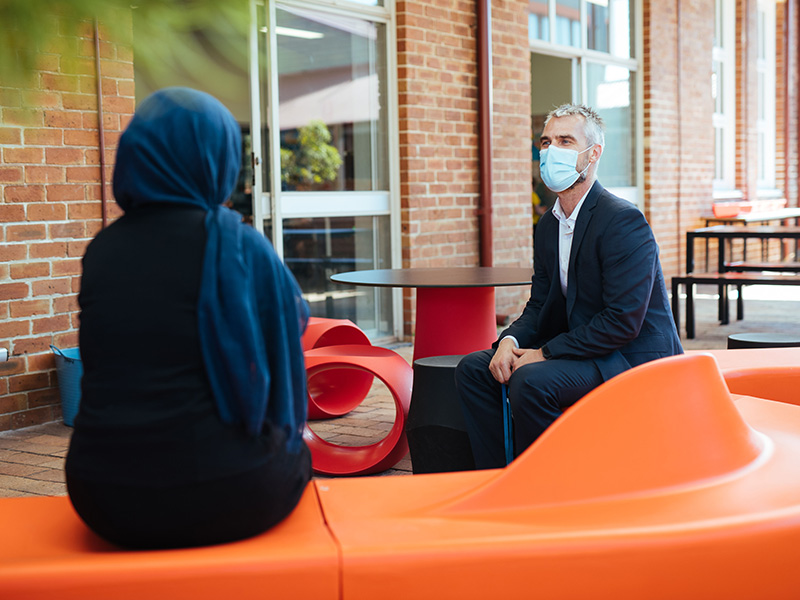
Laila and Principal Bradley
Back in a Newcastle classroom sits an indisputable example of what happens when we get it right.
Having arrived with no English in Principal Bradley’s primary school six years ago, Laila’s younger sister Mariam is now 16 and excelling in her journey.
Captain of her high school and top of her class in multiple subjects, including English, she has her eye on a degree in Radiography.
She and Laila converse rapidly in Dari as Laila confirms the correct translation for her sentiments.
“I’m so proud of my little sister, she has achieved so much. I know she will do great things,” Laila beams.
“I’m so proud of my little sister, she has achieved so much. I know she will do great things."


